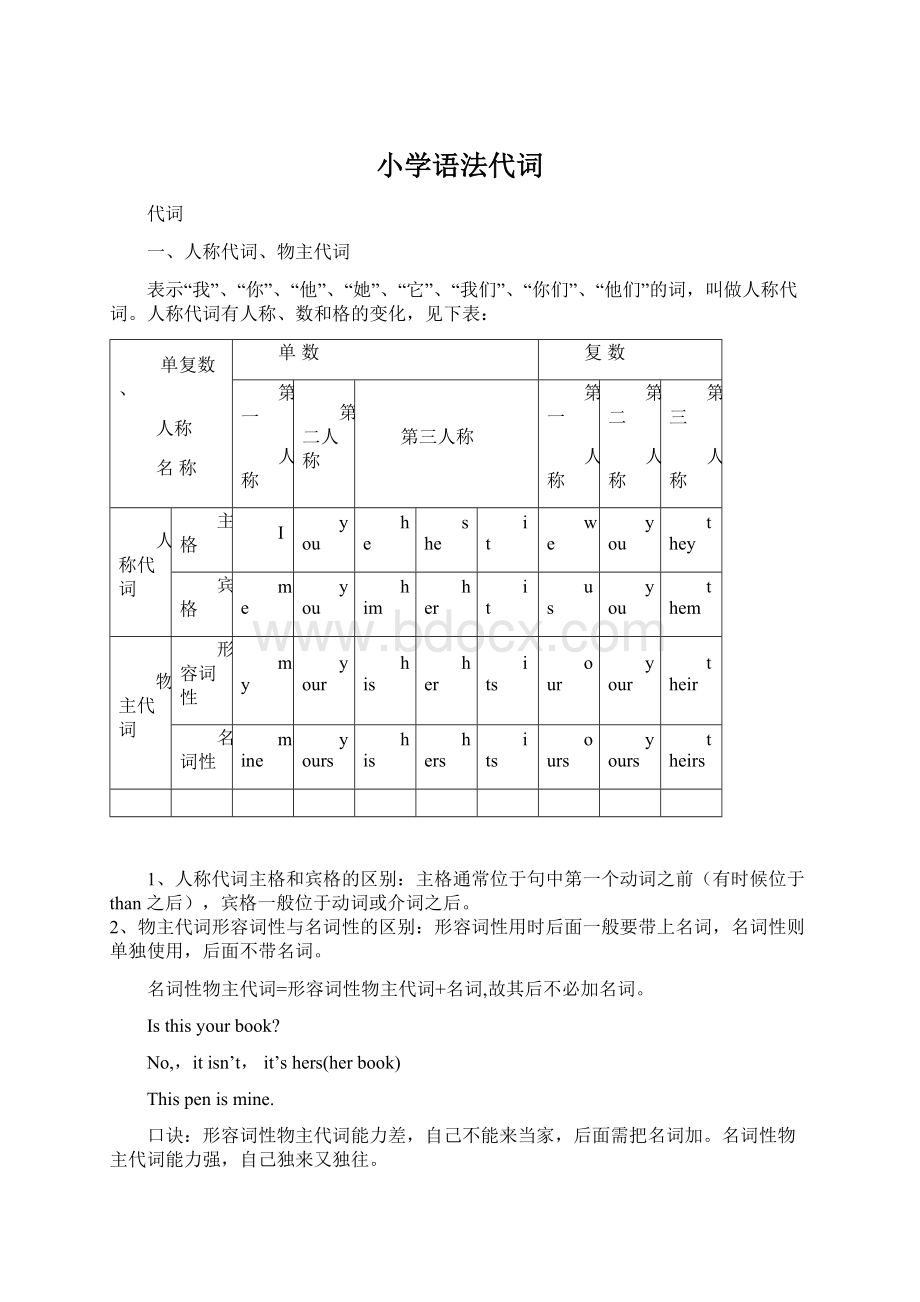小学语法代词.docx
《小学语法代词.docx》由会员分享,可在线阅读,更多相关《小学语法代词.docx(11页珍藏版)》请在冰豆网上搜索。

小学语法代词
代词
一、人称代词、物主代词
表示“我”、“你”、“他”、“她”、“它”、“我们”、“你们”、“他们”的词,叫做人称代词。
人称代词有人称、数和格的变化,见下表:
单复数、
人称
名称
单数
复数
第一
人称
第二人称
第三人称
第一
人称
第二
人称
第三
人称
人称代词
主格
I
you
he
she
it
we
you
they
宾格
me
you
him
her
it
us
you
them
物主代词
形容词性
my
your
his
her
its
our
your
their
名词性
mine
yours
his
hers
its
ours
yours
theirs
1、人称代词主格和宾格的区别:
主格通常位于句中第一个动词之前(有时候位于than之后),宾格一般位于动词或介词之后。
2、物主代词形容词性与名词性的区别:
形容词性用时后面一般要带上名词,名词性则单独使用,后面不带名词。
名词性物主代词=形容词性物主代词+名词,故其后不必加名词。
Isthisyourbook?
No,,itisn’t,it’shers(herbook)
Thispenismine.
口诀:
形容词性物主代词能力差,自己不能来当家,后面需把名词加。
名词性物主代词能力强,自己独来又独往。
二、反身代词
表示"我自己","你自己","他自己","我们自己","你们自己"等表示自身或强调自身的代词称为反身代词。
(动词所表达的动作返回到动作者本身)反身代词有人称和数的变化,其形式如下表:
单数:
myself、yourself、himself、herself、itself、
复数:
ourselves、yourselves、themselves
其构成规则是:
第一、二人称:
在形容词性物主代词后加self或selves
第三人称:
在人称代词宾格后加self或selves
HetaughthimselfEnglish.Helpyourselftosometea.
Theboyistooyoungtolookafterhimself.(介词宾语)
要牢记反身代词与及物动词构成的固定搭配:
注意:
enjoyoneself=haveagoodtime(过得很愉快)
byoneself=alone(单独、独自)
helponeselfto…(随便吃/喝些...)
learnsth.byoneself=teachoneselfsth.(自学)
lookoneself(照顾自己)
cometooneself(苏醒过来)
washoneself(自己洗澡)
三、指示代词
指示代词是用来指代上下文中出现的人或事的代词。
单数this,that,
复数these,those
this在电话用语中代表自己,that则代表对方。
例如:
Hello!
ThisisMary.IsthatJackspeaking?
四、不定代词
不是指明代替任何特定名词的代词叫做不定代词,具有名词和形容词性质,并有可数和不可数之分,没有确定的对象而有非确定的特指意义。
在句中可作主语、表语、宾语和定语。
现将几个常用的不定代词举例说明如下:
1.some与any
1)someany相当于名词和形容词,作定语时均可以代替可数名词和不可数名词。
some多用于肯定句,可作主语、宾语、表语、定语。
表示“一些,几个”。
作形容词时,后面可以接①不可数名词+单数动词;②可数名词+复数动词。
Someofthestudentsarecleaningthelibrary.
.Somericeinthebaghasbeensoldout.
Someoftheboysaregoodatswimming.
any多用于疑问句、否定句和条件状语从句中,表示“一些,任何”,在句中用作主语、宾语、定语。
用作形容词时,后面可以接①不可数名词+单数动词;②可数名词+复数动词。
Anyofyoucandoit.
Haveyougotanycolourchalk?
Arethereanystampsinyourdrawer?
2)、if引导的条件句中,用any不用some.
Ifyouhaveanymoney,buysomebooks.
Ifyouhaveanyquestions,pleaseaskme.
3)、:
在表示请求、劝告、邀请、或不希望对方拒绝的疑问句中用some而不用any。
Willyougivemesomewater?
Wouldyoulikesomemeat?
CouldIhavesomeapples?
MayIasksomequestions?
Whynotbuysomefruitforher?
4)、some和any可以用来修饰单数名词,any用在肯定句中时,意思是“任何的”。
Anystudentcananswerthisquestion.
Youcantakeanybookyoulike.
SomedayChinesepeoplewillflytothemoon.
Youmaycomeatanytime.
5)、any也可与比较级连用,表示程度。
Issheanybettertoday?
2.few,afew,little,alittle
用法用于可数名词用于不可数名词
表示肯定概念afew虽少,但有几个alittle,虽少,但有一点
表示否定概念few不多,几乎没有little不多,没有什么
1)、它们在句中都可作主语、宾语和定语。
FewofushavebeentoBeijing.
Iknowlittleaboutthebook.
Thereisalittlewaterinthiabottle.
Hehasfewfriends.
2)、alittle和little也可以用作副词,alittle表示“有点,稍微”,little表示“很少”。
I'malittlehungry.(修饰形容词hungry)
Lethimsleepalittle.(修饰动词sleep)
Mary,goalittlefaster,please.(修饰副词比较级)
Shesleptverylittlelastnight.
3.other,theother,others,theothers,another,
other某一个,另一些,其他的。
不能单独使用,后面需跟单数名词或复数名词,泛指别的。
others其它。
必须单独使用,泛指别人或别的东西。
常用于“some…others”结构。
theother两个中的另一个,剩下的一个。
特指。
常用于“one…theother…”结构。
theothers其他全部,其余的。
表示在一个范围内的其他全部。
Theother+单数或复数名词表示在一定范围内的另一个或几个,特指。
another另一个(指多个中的任何一个)可单独用,也可接单数名词,还可接名词复数,表示另几个,再几个。
Wherearehisotherbooks?
Somearered,andothersareblack.
Shehastwosisters,oneisanurse,theotherisateacher.
Somewenttothecinema,otherswentswimming.
InourclassonlyTomisEnglish,theothersareChinese.
Wouldyouhaveanothercupoftea?
Youcanseeanothershipinthesea,can'tyou?
Showmeanotherone,please?
I'mstillhungryafterI'vehadthiscake.Pleasegivemeanother.
4.every与each
each每一个,强调个别情况。
主、宾、定、状,可单独使用,可做代名词、形容词、用于两者或两者以上中的每一个人或物。
every每一个,强调整体,“每个都”“人人都”,只作定语,不可单独使用,仅作形容词,用于三者或三者以上每一个人或物。
Theteachergaveatoytoeachchild.
Eachballhasadifferentcolour.(定)
Igaveeachanapplewhentheycame.(宾)
当我们说eachchild,eachstudent或eachteacher时,我们想到的是一个人的情况。
而当我们说everychild和everystudent时,我们想到的是全体的情况,every的意思与all接近,表示他们都如此。
EverystudentlovestheEnglishteacher.=AllstudentslovetheEnglishteacher.
Everychildlikesplaying.=Allchildrenlikeplaying.
1)、只能说eachof,不能说everyof,everyone=each
Eachoftheroomscanholdtwentypeople.(主)
2)、eachevery作定语时,后加单数名词;each作主语时谓语动词用单数。
Eachstudenthasabook.
Everystudenthasabook.
3)表达“每几个”,只能用every
Everyfourdays每四天
Everyotherday每隔一天
Everyfewmetres每隔几米
5.all,both,none,either,neither的用法。
1)all指三者以上,或不可数的东西。
谓语动词既可以用单数,也可以用作复数。
在句中作主语、表语、宾语、同位语和定语。
both两个人或事物,对两者的肯定
none三者或三者以上都不,是all的全部否定式,后不直接接名词,需加of再加名词,动词可单可复。
either对两者之一的肯定,
neither对两者的否定,是both的全部否定式
2)并列连词的使用
Either…or…EitheryouorIamright.
neither…nor…NeithermysisternorIamright.
6、much只修饰不可数名词,muchwater
many只修饰可数名词,manybooks
比较:
alotof
lotsof可接可数名词或不可数名词,但一般只用于肯定句、在疑问句或否定句中,则用much和many。
7、复合不定代词——由some,any,no,every加上-body,-one,-thing构成。
1).在句中作主、宾、表。
复合不定代词一般用作单数。
Nobodyisabsent.
Doyouneedanything?
Grammerisnoteverything.
2)、复合不定代词被定语修饰时,定语须放在它们后面。
Thereisnothingwrongwiththeradio.
Isthereanythingimportant?
Anythingelse?
3)由some组成的不定代词用于肯定句,由any合成的不定代词用于否定句,疑问和条件句,有些疑问句在表示请求、建议和反问时,也可以用some合成的不定代词。
4).everyone每一个人,人人,大家,单独使用,不可接of短语。
everyone一个人,一件事情。
一般要接of短语。
5),由any合成的不定代词,不能在否定句中作主语。
如:
不能说:
Anybodydoesn’tgotoseethefilm.
而应改成:
Nobodygoestoseethefilm.
五、相互代词
表示相互关系的代词叫做相互代词。
相互代词有eachother和oneanother两种形式。
Thestudentsoftenhelpeachother.
六、疑问代词
一般都放在句首,用来构成特殊疑问句的代词叫疑问代词,在句子中作为某一句子成分。
疑问代词有
指人:
who,whom,whose指物:
what既可指人又可指物:
which
Whichofthoseisyours?
(作主语)
Whoseisthewatchonthetable?
(作表语)
Whoseumbrellaisthis?
(作定语)
Whomareyouwaitingfor?
(作宾语)
练习题:
一、用所给代词的正确形式填空。
1.Theseare______(he)brothers.
2.Thatis_______(she)sister.
3.Lilyis_______(Lucy)sister.
4.Tom,thisis_____(me)cousin,Mary.
5.Now_____________(herparent) areinAmerica.
6.Those__children________(child)are_____(I)father’sstudents.
7.Doyouknow ______(it)name?
8.MikeandTom__________(be)friends.
9.Thanksforhelping________(I).
10.______(Ann安)motheris______(we)teacher.
二,填上正确的人称代词和物主代词
1. _____ismyfriend. 他是我的朋友。
2. Mydoglikes_____.我的狗喜欢她。
3. Whoisthere?
It’s_____. 是谁啊?
是我。
4. Comewith_____. 跟我来。
5. ______classroomisbiggerthan____.你们的教室比我们的要大。
6. _____areChinese.我们是中国人。
7. Iwanttobuysomeballoonsfor______.我想买些气球送给他。
8. Theseare______photos.这些是我们的照片。
9. _____like______verymuch. 他们非常喜欢它。
10. Let_____give_____abook.让我给你一本书。
11.Thisis_____father. 这是我的爸爸。
12. Isthatbike______?
Yes,it’s______.那辆自行车是你的吗?
是,它是我的。
13. _____like______car.我喜欢他们的小汽车。
14. Ourschoolishere,and______isthere.我们的学校在这儿,他们的在那儿.
15. Whosebikeisthis?
It’s______(=___________).这是谁的自行车?
是她的。
16.Isthatcar______?
Yes,it’s______.那辆车是你的吗?
是的,它是我的。
三,改错。
1.Myamhisclassmate.
2.TheyalllikeI.
3.Thisisnotshepen.
4.Ourarethetwins.
5.Thsesaretheydesks.
6.lisen,herissingingapopsong.
7.Whoishe?
---Hismycousin.
8.Whatishefather?
9.Hispenisred,butmyisblue.
四,选择正确的答案。
1,Is____newhouselargerthan____?
A,you,themB,your,theirsC,your,them
2,____classroomishere.____isoverthere.
A,Ours,TheirsB,Our,TheirC,Our,Theirs
3,Let____begin____class.
A,us,usB,us,ourC,we,our
4,Pleasegive____and____friendsometea.
A,me,myB,I,myC,mine,mine
5,Herearetwobags.____is____?
A,Who’s,yoursB,What,yourC,which,yours
6,Mywatchisbroken.Canyourepair(修理)____for____?
A,it,IB,it,meC,it,we
7,MycousinputonmydressandIputon____.
A,sheB,herC,hers
8,____uncletook____toabasketballmatchyesterdayafternoon.
A,His,heB,His,himC,He,his
9,Theseflowersarefor____.
A,youandIB,youandweC,youandme
10,Lookatthesemonkeys.Let’sfeed____somebananas.
A,theyB,theirC,them
11,Thisisn’t____bag.____isathome.
A,your,YoursB,your,YourC,yours,Your
12,TherearefortystudentsinClass1.Twenty-threeof____aregirls
A,theirB,themC,they
13,Who’ssingingoverthere?
____isSandy’ssister.A,ThatB,ItC,She
不定代词专项训练
I.用some、any填空。
1.Thereisn’t_______waterinthebottle.
2.Doyouhave_______Englishbooks?
No,Idon’thave_______.
3.Thereare_______peopleintheroom.
4.Couldyougiveme________paper,please?
5.Ifthereis_______meat,Iwillbuy________.
6.Iwillcometoseeyou_______day.
7.LiMingismorecarefulthan______otherboyintheclass.
8.Wouldyoulike_______pop,please?
II.用many、much、alotof填空。
1.Thereare________peopleinthestreet.
2.Idon’thave________money,butIhave_______friends.
3._______foreignerscometovisittheGreatWalleveryday.
4.Ihaveso______fallsthatI’mblackandblueallover.
5.Thereistoo_______homeworkforstudentstodonow.
6.Iwanttoknowwhetherhehas________meat.
7.Doyouknow_________Englishfood?
8.Iwanttobuy________bookstoread.
III.用little,alittle,few&afew填空。
1.Don’tworry.Thereis________timeleft.
2.Hedidverywellintheexam.Sohemade_______mistakes.
3.DoyouhaveanyfriendsintheUS?
Yes,Ihave________.
4.Hecan’tunderstandmyEnglishwords,becauseheknows__________English.
5.Very________ofuscanspeakFrench.
6.CouldIhavesomewater,please?
Sorry,Ihave_______now.
7.Hehasmadequite________friendsinChina.
8.Wouldyoulikesomerice?
Thanks,butjust________.
IV.用all、both、every、each填空。
1.______